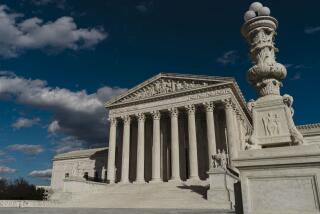Meese’s Attack on Miranda Rule
- Share via
It is utterly frightening to read that Atty. Gen. Edwin Meese III has set himself above the Supreme Court and Constitution of our nation. In his attack on the Miranda decision, Meese has been quoted as saying (1) that decisions of the Supreme Court do not necessarily constitute the operative law of the land and (2) that it should be considered in most cases that anyone who is arrested for a crime is guilty of that crime. It must be admitted, of course, that present indications suggest that our President may not know what Meese is up to.
One would wonder if the attorney general was born and brought up in one of the nations that follow the Napoleonic Code, saying “anyone arrested for a crime is presumed to be guilty until proven innocent.” He also seems to be unaware that the Fifth Amendment provides that “no person shall be compelled in any criminal case to be a witness against himself.” If the courts cannot be sure that the accused knows of such a right and has waived this right, the prosecution must therefore use only evidence other than sayings of the accused.
We have inherited from the English common law, dating back to the Magna Carta, the concept that guilt rather than innocence must be the case to be proven and that self-incrimination or spousal testimony may not be compelled. The Miranda case has simply provided that a person charged with a crime must acknowledge that knowledge of the rights exists and that a choice ha been made either to accept these rights or waive them.
Meese is also quoted as saying that his complaint against Miranda is that it makes it harder to convict criminals. What this says to me is that a successful prosecution is so important that it should occur even when the “perpetrator” has not been advised of these constitutional rights and when charging is tantamount to conviction--making the arresting officer both judge and jury! Shades of the Spanish Inquisition, the burning of Joan at the stake, and the imprisonment of the Count of Monte Cristo! This is not the American way for which I fought and for which many of my friends died!
Meese belongs in Mexico, France or Spain, certainly not as the head of the U.S. Department of Justice. When I stood, in 1983, in the meadow of Runnymede, at the memorial commemorating the signing of the Magna Carta, I knew little or nothing of the enemy of democracy named Edwin Meese. I was proud that the American Bar Assn. had built and dedicated this memorial in 1957. Nearby I also spent some somber moments at the Commonwealth Air Force Memorial honoring 20,456 airmen of the British Commonwealth who had died for the rights of their fellow citizens. And the week before I had met with 1,000 Eighth Air Force veterans to pay honor to their buddies who lie in a cemetery near the city of Cambridge.
And now I find that the man entrusted with ensuring legal justice for all has spoken such un-American views; my heart is chilled! One of my friends commented, after reading the Meese quotes, that this must have been the same chilling sense of dishonor that many Germans felt during the days of the Hitler regime. Another recalled the lack of humanity in an earlier remark of Meese disavowing the actual needs of the homeless and hungry. How do men such as Meese rise to positions of power and importance? Perhaps the real disgrace is ours!
ELWOOD M. JONES JR.
San Diego
More to Read
Get the L.A. Times Politics newsletter
Deeply reported insights into legislation, politics and policy from Sacramento, Washington and beyond. In your inbox twice per week.
You may occasionally receive promotional content from the Los Angeles Times.








